James Holland was a crabber for more than 30 years. Now he’s the president and full-time field director of the Altamaha Riverkeeper, an activist group he founded to clean up Georgia’s biggest river basin.
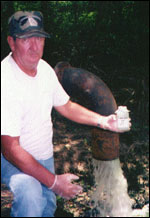
James Holland — he doesn’t
wear fleece.
The rough-hewn Holland — with his missing front teeth, ninth-grade education, and fierce determination — embodies the new environmental movement in the Deep South. This movement is led by people who wouldn’t be caught dead in a trendy coffee shop. They buy the trappings for a wilderness trip from Wal-Mart and the Piggly Wiggly. They don’t have memberships in the Sierra Club. Rather, they are folks who make a living off the land they love just like their daddies did. They are sick and tired of having the natural resources they depend on poisoned by big money and ignored by big government.
Blue crabs depend on clean estuary environments, just the right balance of pure fresh and salt water. Over the course of his career, Holland watched his crab harvest drop from 1,500 pounds a day to 160 pounds, thanks to the steady degradation of the Altamaha ecosystem.
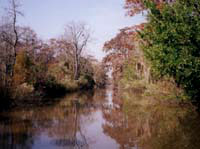
Remember the Altamaha.
Photo: Camille Heaton Archibald.
In 1996, Holland and a few other angry crabbers decided to do something extreme. They formed an environmental group, an unprecedented act by crabbers in the small south Georgia town of Darien.
“The crabbers finally learned we need clean, fresh water,” Holland said. “They’re getting a lesson that the environment does matter. It took a long time to teach ’em.”
The River Wild
The Nature Conservancy has called the Altamaha River basin one of “the last great places.” The group’s Altamaha bioreserve program headquarters is in Darien, down the street from both the Riverkeeper office and the office of the Coastal Center of Sustainable Development. Thanks to efforts to restore and protect the Altamaha, there are probably more employed environmentalists per capita in Darien than in any other Georgia town.
The Altamaha is still fairly wild. Until a couple of years ago, it was dotted with ramshackle plywood houseboats where barefoot families spent the summers without benefit of plumbing.
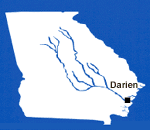
The Altamaha River system.
The river runs flat, broad, and undammed for 138 miles from the Georgia piedmont to the salt marshes along the coast. More than 100 rare plant and animal species live along the waterway, which meanders through hardwood floodplains and cypress swamps that have never been cut. The cypresses on Bear Island, in the Altamaha estuary, are said to be more than 1,000 years old.
The Altamaha flows through Holland like blood does through other folks. You hurt the river, and you hurt him.
“When we were little, we didn’t know no better. We dumped stuff in the river, everybody did,” Holland said. ” But now we know. Now we know what it’s worth and we may lose it.”
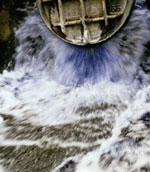
Sewage runs through it.
Photo: Altamaha Riverkeeper.
Plenty of people still dump in Holland’s river, though. There are more than 100 state permits allowing treated sewage and other pollutants to be discharged into the Altamaha. There is untold runoff from timber plantations and farm fields. A private utility wants to take out fresh water for future development. The level of nutrients in the river has doubled in the past 20 years. Fish kills are noted each summer, and now a parasite triggered by pollution is turning the blood of adult blue crabs into a milky soup.
“It’s got so bad out there it [the crab industry] may crash this year,” Holland said. “It’s much worse than last year. The only thing that keeps some of them boys going is demand is strong.”
Feeling Crabby
Though Holland is a vigilant advocate for the river and the crabbers it supports, not everyone in Darien likes him. The crabbers who have not joined his group say he’s done it all for personal gain and fame.
“It’s all crap,” Holland said of his critics’ charges. “I’m still in the river, in the mud. I still get dirty.”
But now, instead of tugging heavy crab traps into a small boat, Holland pulls water samples from the river and nabs polluters. Last week he drove 150 miles to deliver some diseased blue crabs to a biochemist for analysis. On the way, he took a dozen water samples to be tested for fecal coliform.
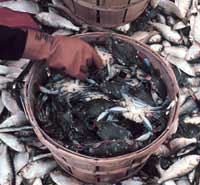
Up for crabs.
Photo: NOAA.
Holland is too busy these days to crab himself, but he hasn’t lost touch with the trade. His wife and daughter have taken over his crab wholesale business and one of his two sons crabs for a living.
Holland has his fans, too. Some activists say he’s the best thing to ever come along for the south Georgia environment. To the college students who work as interns in the Riverkeeper office between biology and chemistry classes, Holland is a genuine hero. The real thing.
He might have acquired even more admirers had he attended the International Water Keeper Alliance conference in California in June, along with Robert Kennedy, Jr., and representatives from other water keeper organizations. The water keeper movement has taken hold in 40 areas throughout North and Central America, with citizens, biologists, and lawyers working together to reclaim their rivers, bays, and other local waters. But Holland didn’t make it to the meeting. He won’t set foot on an airplane.
Ask Holland if he’s hopeful about the Altamaha and he chews the question over awhile like a piece of gristle. Finally he says no.
“I’m not hopeful when every way you look you see things minimized by what people are doing and how they continue to get away with it. But maybe we can turn some of it around.”


